Our last jazz cruise was aboard the SS Norway with Joe Williams. It seems like forever ago – ten years, actually. After he died we hadn’t had occasion to go again…until now. This year Clairdee was part of a stellar lineup that included the Dizzy Alumni Big Band (with lots of our friends including Jimmy Heath, James Moody, Slide Hampton and Jay Ashby), Lewis Nash’s group with Renee Rosnes and Peter Washington (one of John’s favorite bassists), the Cyrus Chestnut trio and many, many more. The jazz cruises have been under new management for some time now, and the Holland America line has replaced the Norwegian line as host, so we booked passage on the ms Westerdam.
We flew to Ft Lauderdale on Saturday and spent the night in Hollywood. The usual arrival confusion and airport antics haven’t changed, especially for bass players – over-sized bass coffins coming down the luggage shoots despite the extra tariff paid for special handling, hotel vans that are too small to accommodate the equipment…. But jazz musicians are, by and large, road warriors and they cope. Clairdee’s bassist snagged a van built to take disabled passengers in wheelchairs, and soon enough we were feasting on cracked crab dinners. “Tell Sal that Johnny sent you,†said the hotel concierge as he pointed us toward the upstairs at Billy’s Stone Crab restaurant.
Bright and early Sunday morning the musicians gathered in the lobby to board buses that would take us to the dock. More general confusion as we waited dockside on the buses for awhile, watching the previous week’s cruise passengers disembark, but soon enough we were through the immigration lines, duly quizzed and photographed. They had to put us somewhere until our staterooms were ready, so we were directed to the Lido Deck for lunch. Food, again; besides listening to music, eating and drinking, talking and sunning were to be the primary activities of the week. By noon the skies were partly cloudy, the temperature was about 80F and winds at 12 knots (13.8 mph) were blowing east-north-east, a moderate breeze, just strong enough to rustle small branches ashore.
 At 950 feet long and 106 feet wide, The Westerdam, built in 2004, is just slightly smaller than the Norway (a difference of less than 14,000 sq ft. or about 12%) – walk three times around the Westerdam promenade and you’ve traveled one mile. The ship has 11 decks, 14 elevators, lots of stairs, two swimming pools, bars, lounges, a casino, even an internet café. Our cabin was on Deck 5, the Verandah Deck half way between the mid and aft of the ship. It was compact, but we had a small couch and the floor-to-ceiling glass door to the private deck with two chairs made it feel spacious. As we waited for our luggage to appear, we explored our room in search of drawer space, which we finally discovered under the bed hidden by a dust ruffle.
At 950 feet long and 106 feet wide, The Westerdam, built in 2004, is just slightly smaller than the Norway (a difference of less than 14,000 sq ft. or about 12%) – walk three times around the Westerdam promenade and you’ve traveled one mile. The ship has 11 decks, 14 elevators, lots of stairs, two swimming pools, bars, lounges, a casino, even an internet café. Our cabin was on Deck 5, the Verandah Deck half way between the mid and aft of the ship. It was compact, but we had a small couch and the floor-to-ceiling glass door to the private deck with two chairs made it feel spacious. As we waited for our luggage to appear, we explored our room in search of drawer space, which we finally discovered under the bed hidden by a dust ruffle.
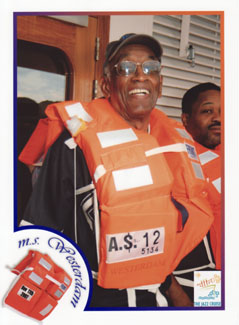
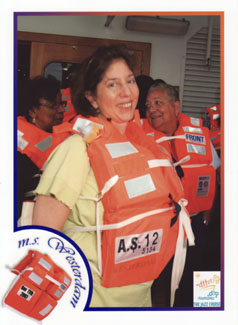 The first order of ship’s business was the mandatory lifeboat drill at 4 pm. I thought it would take longer for 1802 guests to be logged in as present and accounted for, but at exactly 4:56 the crew let go the lines and we were un-docked. Thirty minutes later the sea voyage officially commenced and Nassau lay 183 nautical miles (210.45 statute miles) away as we cruised off relatively slowly at 14.6 knots (or about 16.8 miles per hour).
The first order of ship’s business was the mandatory lifeboat drill at 4 pm. I thought it would take longer for 1802 guests to be logged in as present and accounted for, but at exactly 4:56 the crew let go the lines and we were un-docked. Thirty minutes later the sea voyage officially commenced and Nassau lay 183 nautical miles (210.45 statute miles) away as we cruised off relatively slowly at 14.6 knots (or about 16.8 miles per hour).
And then it was time to eat, again. We were assigned to the first dinner seating, 5:30 pm, on the upper level of the Vista Dining room. Table 69 seats 10, and our tablemates were Slide Hampton and Evelyn, Jimmy Heath and Mona, James Moody and Linda, and Walter Nisenson and Paula. Overall, the food was excellent and the service impressive. (more about the crew later)
The opening night festivities – Showtime In The Vista Lounge – took place in the ship’s official showroom with a proper stage and sound system, but with arena seating spanning two-decks in height, controlling the sound for jazz groups would be an ongoing challenge. The program was designed to give the audience a little sample of what was to come, and with so many performers aboard, groups and soloists were paired up in make-shift configurations and asked to play one tune only.
Lynne Arriale’s trio joined by saxophonist Houston Person opened with Namely You, a song I remember from the musical show Li’l Abner, lyrics by Johnny Mercer. Next up was baritone vocalist Jamie Davis with a vibrato a la Eckstine paired with saxman Plas Johnson. Plas’s rendition felt truer to the lyric than the actual vocal and so brought to mind an earlier dinner conversation when Jimmy Heath old a story about being in Copenhagen and Ben Webster asking him to write out the words to For Heaven Sake because he wanted to play it – Ben knew the melody and changes but wouldn’t play it until he knew the words, the intent. I’d heard this about Ben Webster before, from John, and he frequently imparts this same bit of wisdom to up-and-coming singers and always attributes it to Ben Webster.
They were followed by a comedy break – Pete Barbuti backed by Eddie Higgins on piano, Tom Kennedy on bass, Ernie Adams on drums – and the audience loved it. I’m not a big fan of schtick, but Pete is funny and I have a residual soft-spot for him as he was one of Joe Williams’ favorites.
Next up was the oh-so-tight trio of Renee Rosnes, Peter Washington and Lewis Nash augmented by Gil Castiano on trumpet and Charles McPherson on alto sax. The trio alone was cooking, a simmering blend perfected by lot of experience — like the roux of the best gumbo — but when the horns came in they never found the groove – lots of notes in a hurry — where’s the fire?
A bass and bone duo? Bassist Jay Leonhart and trombonist Wycliffe Gordon are both consummate musicians who manage a cerebral blend of comedy and music that I can and do appreciate. During a very clever rendition of Lester Leaps In they even switched roles so that Jay was singing the trombone and Wycliffe was clucking the bass. (Perhaps you had to be there, or hear it for yourself on their CD titled This Rhythm On My Mind – I bought the CD, thirteen tracks with a tiny bit of sax or percussion assistance on three. If I had not heard them live the first night, I would never have thought to buy it as I would have assumed it was more gimmick and/or comedy than music. That would have been a sorry mistake.)
Then Clairdee joined Jay for a sassy bass and vocal duet on Do Nothin’ Til You Hear From Me. And the program concluded with Mike LeDonne on piano, Christoph Luty on bass, Jeff Hamilton on drums, Eric Alexander on sax, Ken Peplowski on clarinet and Arturo Sandoval on trumpet.
There was plenty more to hear in the various rooms afloat that night, but we were pooped and off to sleep we went.
PS: All of the artist links in this posting take you to YouTube videoclips

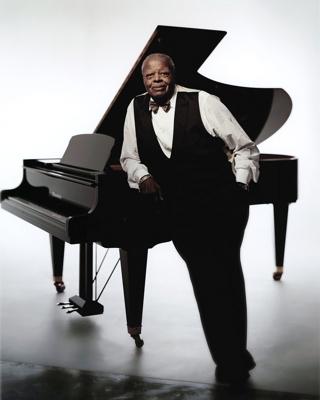 A free-admission memorial concert for
A free-admission memorial concert for 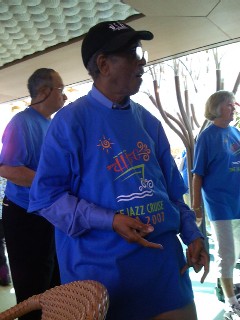 By noon it was a breezy 78-degrees with winds from the East-North-East at 22knots (25.3mph) and poolside was crowded with jazz cruisers (including Jimmy Heath, left) all wearing their blue cruise t-shirts that entitled them to free drinks. Pina Coladas in the sun made me miss the Keyboard Capers (a series of piano solos) but I did make it later to hear the first four tunes in
By noon it was a breezy 78-degrees with winds from the East-North-East at 22knots (25.3mph) and poolside was crowded with jazz cruisers (including Jimmy Heath, left) all wearing their blue cruise t-shirts that entitled them to free drinks. Pina Coladas in the sun made me miss the Keyboard Capers (a series of piano solos) but I did make it later to hear the first four tunes in 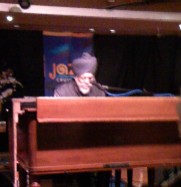 After dinner we caught
After dinner we caught 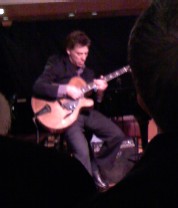 With
With 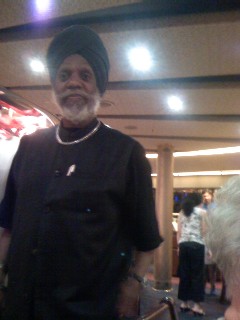 Organ master Dr. Lonnie Smith was up early too, and I had breakfast with him and a documentary filmmaker named Bill. Conversation ranged from whether or not we wanted to go ashore and peruse the
Organ master Dr. Lonnie Smith was up early too, and I had breakfast with him and a documentary filmmaker named Bill. Conversation ranged from whether or not we wanted to go ashore and peruse the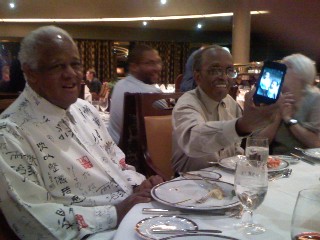 Following dinner, during which
Following dinner, during which 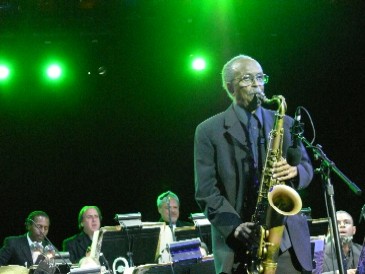

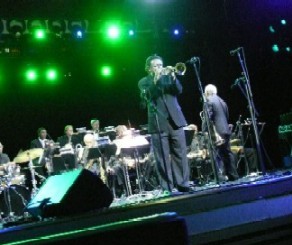
 At 950 feet long and 106 feet wide, The Westerdam, built in 2004, is just slightly smaller than the Norway (a difference of less than 14,000 sq ft. or about 12%) – walk three times around the Westerdam promenade and you’ve traveled one mile. The ship has 11 decks, 14 elevators, lots of stairs, two swimming pools, bars, lounges, a casino, even an internet café. Our cabin was on Deck 5, the Verandah Deck half way between the mid and aft of the ship. It was compact, but we had a small couch and the floor-to-ceiling glass door to the private deck with two chairs made it feel spacious. As we waited for our luggage to appear, we explored our room in search of drawer space, which we finally discovered under the bed hidden by a dust ruffle.
At 950 feet long and 106 feet wide, The Westerdam, built in 2004, is just slightly smaller than the Norway (a difference of less than 14,000 sq ft. or about 12%) – walk three times around the Westerdam promenade and you’ve traveled one mile. The ship has 11 decks, 14 elevators, lots of stairs, two swimming pools, bars, lounges, a casino, even an internet café. Our cabin was on Deck 5, the Verandah Deck half way between the mid and aft of the ship. It was compact, but we had a small couch and the floor-to-ceiling glass door to the private deck with two chairs made it feel spacious. As we waited for our luggage to appear, we explored our room in search of drawer space, which we finally discovered under the bed hidden by a dust ruffle.
 The first order of ship’s business was the mandatory lifeboat drill at 4 pm. I thought it would take longer for 1802 guests to be logged in as present and accounted for, but at exactly 4:56 the crew let go the lines and we were un-docked. Thirty minutes later the sea voyage officially commenced and Nassau lay 183 nautical miles (210.45 statute miles) away as we cruised off relatively slowly at 14.6 knots (or about 16.8 miles per hour).
The first order of ship’s business was the mandatory lifeboat drill at 4 pm. I thought it would take longer for 1802 guests to be logged in as present and accounted for, but at exactly 4:56 the crew let go the lines and we were un-docked. Thirty minutes later the sea voyage officially commenced and Nassau lay 183 nautical miles (210.45 statute miles) away as we cruised off relatively slowly at 14.6 knots (or about 16.8 miles per hour).
 I share today with Sarah ‘Fergie’ Ferguson, Duchess of York (1959), chef Emeril Lagasse (1959), director Penny Marshall (1942, and yes, I remember when she was an actress), Linda Lavin (1937, also an actress), businessman Lee Iacocca (1924), novelist Mario Puzo (1920), Arthur Schlesinger, Jr. historian (1917), economist John Kenneth Galbraith (1908), writer PG Wodehouse (1881), philosopher Friedrich Nietzsche (1844), and poet Virgil (read The Aeneid in high school; 70 BC – Virgil’s dob, not my year in high-school), to name just a few.
I share today with Sarah ‘Fergie’ Ferguson, Duchess of York (1959), chef Emeril Lagasse (1959), director Penny Marshall (1942, and yes, I remember when she was an actress), Linda Lavin (1937, also an actress), businessman Lee Iacocca (1924), novelist Mario Puzo (1920), Arthur Schlesinger, Jr. historian (1917), economist John Kenneth Galbraith (1908), writer PG Wodehouse (1881), philosopher Friedrich Nietzsche (1844), and poet Virgil (read The Aeneid in high school; 70 BC – Virgil’s dob, not my year in high-school), to name just a few.